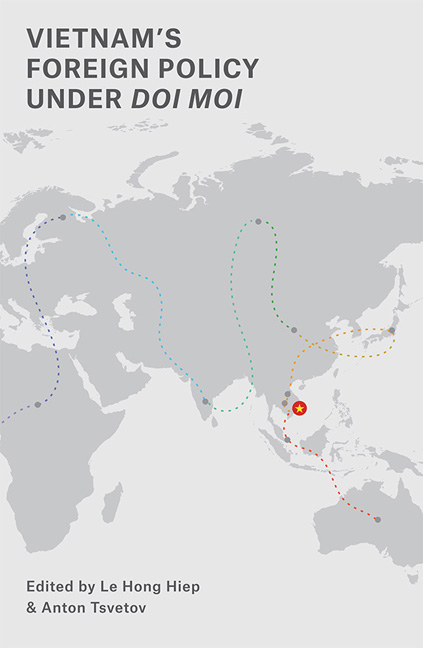Book contents
- Frontmatter
- Contents
- List of Tables
- List of Figures
- List of Abbreviations
- Acknowledgements
- About the Contributors
- PART I ANALYTICAL AND HISTORICAL FRAMEWORK
- PART II BILATERAL RELATIONSHIPS
- 3 The Evolution of Strategic Trust in Vietnam–U.S. Relations
- 4 The 2014 Oil Rig Crisis and its Implications for Vietnam–China Relations
- 5 Vietnam–Japan Relations: Moving beyond Economic Cooperation?
- 6 The Reinvigoration of India–Vietnam Partnership under Prime Minister Modi
- 7 Vietnam–Russia Relations: Glorious Past, Uncertain Future
- 8 Vietnam's Foreign Policy Towards its Smaller Neighbours
- 9 Vietnam's Decision to Join ASEAN: The South China Sea Disputes Connection
- PART III MAJOR FOREIGN POLICY ISSUES
- Index
5 - Vietnam–Japan Relations: Moving beyond Economic Cooperation?
from PART II - BILATERAL RELATIONSHIPS
Published online by Cambridge University Press: 04 July 2018
- Frontmatter
- Contents
- List of Tables
- List of Figures
- List of Abbreviations
- Acknowledgements
- About the Contributors
- PART I ANALYTICAL AND HISTORICAL FRAMEWORK
- PART II BILATERAL RELATIONSHIPS
- 3 The Evolution of Strategic Trust in Vietnam–U.S. Relations
- 4 The 2014 Oil Rig Crisis and its Implications for Vietnam–China Relations
- 5 Vietnam–Japan Relations: Moving beyond Economic Cooperation?
- 6 The Reinvigoration of India–Vietnam Partnership under Prime Minister Modi
- 7 Vietnam–Russia Relations: Glorious Past, Uncertain Future
- 8 Vietnam's Foreign Policy Towards its Smaller Neighbours
- 9 Vietnam's Decision to Join ASEAN: The South China Sea Disputes Connection
- PART III MAJOR FOREIGN POLICY ISSUES
- Index
Summary
Unlike most other major bilateral relationships in East Asia, the Vietnam–Japan ties are generally “problem-free”. Although their official relationship was only established in 1973, Vietnam and Japan have a long history of people-to-people connections which date back to the eighth century, when a Vietnamese Buddhist monk named Phat Triet carried out his missionary works in Japan. In the sixteenth century, Japanese merchants set up “Japanese towns” in Hoi An and Pho Hien in central and northern Vietnam, where bilateral trade flourished. As the first Asian country to successfully transform itself into a major power and avoid Western colonization, Japan served as a source of inspiration and a regional hub where Vietnamese patriots would come to learn how to liberate their country from French colonization and to revive their nation. A primary example was the Dong Du Movement led by Phan Boi Chau.1 Although the movement was short-lived due to the adverse historical context at the time, Phan Boi Chau's famous quote that “Vietnamese and Japanese peoples share the same culture, same racial roots, and same continent” [đông văn, đông chung, đông châu] still rightly describe the closeness between the two peoples and societies to date. Despite Japan's military occupation of Indochina during World War II, Vietnam–Japan relations do not carry a historical baggage. Instead, the reconciliation and rapprochement between Hanoi and Tokyo since the restoration of their ties in 1992 have resulted in one of the most fruitful relationships in East Asia.
In 2009, Vietnam and Japan established their “strategic partnership” framework. Due to domestic and external constraints, this strategic partnership has until recently been confined to the economic domain. However, the changing regional geopolitical landscape due to China's rise and its increasing assertiveness in territorial and maritime disputes, the ambiguity of U.S. commitment to Asia, and the lack of effective multilateral frameworks for conflict prevention and management in the region, has made it necessary for Vietnam and Japan to strengthen their strategic partnership as a hedge against economic, security, and strategic challenges of mutual concern. Cooperation in security and strategic realms has been strengthened since 2011, and in March 2014, Hanoi and Tokyo decided to elevate their ties to the level of an “Extensive Strategic Partnership for Peace and Prosperity in Asia”.
- Type
- Chapter
- Information
- Vietnam's Foreign Policy under Doi Moi , pp. 96 - 116Publisher: ISEAS–Yusof Ishak InstitutePrint publication year: 2018



